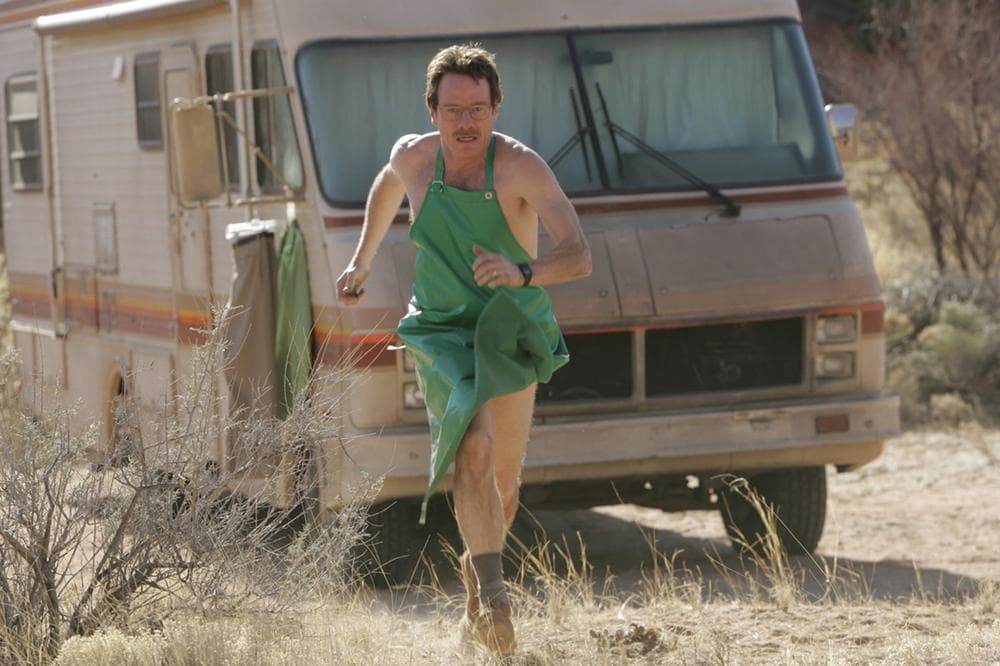Advertisement
American Psycho: Why We Root For Walter White
With the finale of "Breaking Bad" set to air this Sunday to an audience of millions, I’ve been thinking a lot about why the show has become such a phenomenon.
For those of you who haven’t seen it yet, "Breaking Bad" is about a nebbishy high school chemistry teacher named Walter White [Bryan Cranston] who is diagnosed with cancer and starts cooking meth to pay his medical bills and provide an inheritance for his wife, infant daughter, and teenage son, who has cerebral palsy.
Our attraction to these characters is primal: they enact our darkest fantasies of power and violent release. They drive the oldest drama in the earthly repertoire: survival of the fittest.
That’s what the first season is about, anyway. Over the next five seasons, Walter’s motives become increasingly impure. Misfortune, along with a deranged brand of grief, may have lured him into the game. But he stays in it because cooking meth, and murdering people, feeds his suppressed rage. Walter White isn’t a natural born killer, in other words. He evolves into one before our eyes.
Chilling as this may be to witness, his behaviors are driven by a secret hunch most Americans share: that following the rules is for suckers.
In this sense, he’s a lot like the other charismatic sociopaths who populate cable’s marquee programs: Stringer Bell of "The Wire," Al Swearengen of "Deadwood," Nancy Botwin of "Weeds," and of course, the capo di tutti capi: Tony Soprano.
Our attraction to these characters is primal: they enact our darkest fantasies of power and violent release. They drive the oldest drama in the earthly repertoire: survival of the fittest.
But what’s often overlooked are the material motives that all these characters share. Simply put: they are all loyal soldiers in the great army of capitalism.

If you set aside their superficial class and racial differences, each of these figures is engaged in the same exact struggle. They are all seeking to expand their economic territories by keeping one step ahead of their rivals, and the law.
There are laudable aspects to their pursuits. They have to adapt and innovate. They have to make tough decisions. They have to show the courage to take risks.
But as moral actors, they’re walking examples of what Mitt Romney meant when he declared, “corporations are people.” Their ultimate loyalty is to the bottom line. Their success is measured not by financial security or familial harmony, but by the wads of crisp twenties and fifties we see stacked up before them.
And as much as we know we’re supposed to revile guys like Walter White, in our secret hearts we root for them.
I can now hear the chorus of objections from pious viewers, who insist that they think Walter White is a monster who should get his just desserts.
The appeal of shows like 'Breaking Bad' is that they do more than enthrall; they implicate us.
Well, okay. If you insist.
But when I see those slick montages of Walter (or Tony or Stringer or Nancy) working industriously and making bales of cash, I feel the precise vicarious thrill the producers hope to induce.
The appeal of shows like "Breaking Bad" is that they do more than enthrall; they implicate us. They reveal the extent to which we are all Walter White: spit upon by fate, wracked by anxiety, and emasculated by capitalism’s ruthless zero sum game.
Is it any wonder we can’t stop pulling for guys like Walter, who allow us to indulge, if only for an hour each Sunday, in fantasies of amoral omnipotence?
Whatever happens to the guy on Sunday night, he’s already won a place in our cultural history.
For those with the good sense to be distressed by this fact, the question remains: where does that leave the rest of us?
Related:
This program aired on September 27, 2013. The audio for this program is not available.
